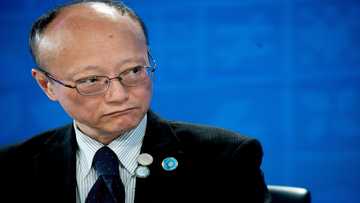Trump says inflation is 'killing our country' under Biden

Source: AFP
Donald Trump accused Joe Biden on Thursday of doing a "poor job" on the US economy and of presiding over a disastrous rise in inflation -- reflecting how rising prices and the cost of living have become key issues ahead of November's presidential election.
"He has not done a good job. He's done a poor job," Trump said during CNN's head-to-head debate with Biden in Atlanta, Georgia. "And inflation is killing our country. It is absolutely killing us."
Biden said the US economy had turned a corner under his leadership, but that more needed to be done to help the working class.
"We got to take a look at what I was left when I became president," he said. "We had an economy that was in free fall. The pandemic was so badly handled, many people were dying."
Americans have named inflation or the cost of living as "the most important financial problem facing their family," in each of the last three years, according to a recent poll from the DC-based firm Gallup.
Perhaps more worryingly for Biden, 46 percent of US adults said they have "a great deal" or "a fair amount" of confidence in Trump to do or recommend the right thing for the world's largest economy, while just 38 percent said the same thing about him, according to another Gallup poll.
PAY ATTENTION: All celebrity news in one place! Follow YEN's Facebook Broadcast channel and read on the go.
Surge in inflation
A post-pandemic supply crunch and the war in Ukraine helped fuel a surge in US consumer inflation, which hit a multi-decade high in 2022.
In response, the US Federal Reserve hiked its key lending rate from almost zero to a two-decade high of between 5.25 and 5.50 percent -- where it has remained for the past year.
Higher interest rates cool down the economy by raising borrowing costs for consumers and businesses, indirectly impacting everything from mortgage rates to auto loans.
Inflation has fallen sharply since the Fed started hiking rates, but remains stuck stubbornly above its long-term target of two percent -- keeping the US central bank on pause as it waits for more positive data.
Because inflation has remained high for a number of years, consumer prices have now risen by around 20 percent since January 2021, when Biden took office, according to the Labor Department's consumer price index (CPI) inflation calculator.
In contrast, consumer prices rose by less than six percent during the same timeframe under Trump.
Although Congress has given the Fed the mandate to tackle inflation on its own, it is still a difficult topic for Biden, who has looked to talk up his economic record ahead of November's election.
'Inflationary' policies
The Fed currently expects inflation will continue to ease this year and next, before hitting its long-term target of two percent in 2026.
But what actually happens next will likely depend on who becomes president in November -- and which parties will control the House of Representatives and the Senate.
Trump has suggested that, if he wins the election, he will look to extend a series of tax cuts made under his leadership, severely restrict immigration, deport some foreign-born illegal immigrants and slap tariffs on all US imports.
These policies would all "likely be inflationary," by putting up prices, placing upward pressure on wages and boosting adding to the nation's debt, JP Morgan economists wrote in a recent note to clients.
As things stand, Republican control of the House, Senate and the White House is not the most likely scenario come November, Oxford Economics lead US economist Bernard Yaros wrote in a recent note to clients.
"If Biden is reelected but presides over a divided government, the upside risk potential to the economy from fiscal policy is limited," he said.
"If Trump returns to the White House with a divided government, he will have a tougher time enacting his fiscal agenda," he added.
PAY ATTENTION: Stay informed and follow us on Google News!
Source: AFP




